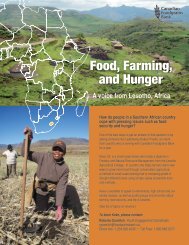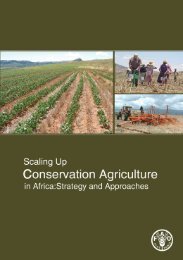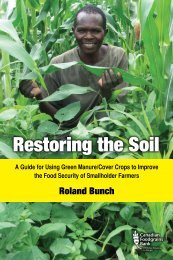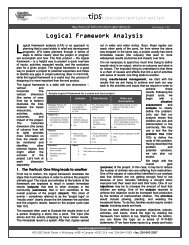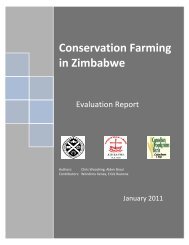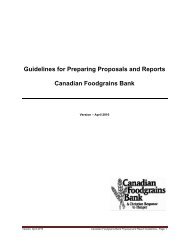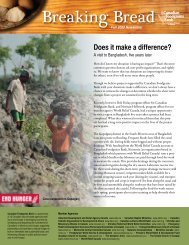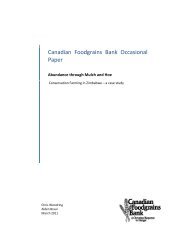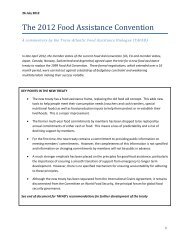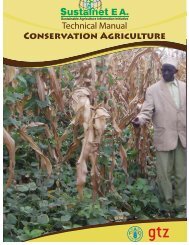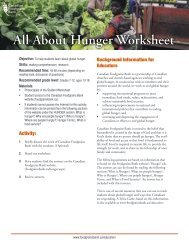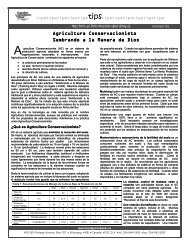A Guide to Conservation Agriculture in Zimbabwe - Canadian ...
A Guide to Conservation Agriculture in Zimbabwe - Canadian ...
A Guide to Conservation Agriculture in Zimbabwe - Canadian ...
Create successful ePaper yourself
Turn your PDF publications into a flip-book with our unique Google optimized e-Paper software.
Promot<strong>in</strong>g <strong>Conservation</strong> <strong>Agriculture</strong> Among Farmers<br />
section TWO<br />
How often have you heard the follow<strong>in</strong>g statement<br />
said by villagers as you work <strong>in</strong> a community<br />
“A, <strong>in</strong>i handisi muchirongwa, takahwa kuti<br />
ndechavarombo”<br />
“A, m<strong>in</strong>a angikho ehlelweni, sezwa kuthiwa<br />
ngolwabayanga”<br />
“I am not part of this programme because I heard that<br />
it is meant for the poor”<br />
<strong>Conservation</strong> agriculture is for all farmers who would like<br />
<strong>to</strong> <strong>in</strong>crease farm productivity and profitability whilst<br />
preserv<strong>in</strong>g the environment for future generations. Keep<br />
the door open <strong>to</strong> all farmers all the time!<br />
Extension approaches<br />
There are three basic methodologies used by organisations<br />
work<strong>in</strong>g with conservation agriculture <strong>in</strong> <strong>Zimbabwe</strong>:<br />
• Extension Agent System: Tra<strong>in</strong>ed extension staff (NGO<br />
or AGRITEX) work directly with groups or clusters of<br />
farmers and support them <strong>in</strong> the implementation of<br />
conservation agriculture <strong>in</strong>terventions on their own<br />
fields.<br />
• Lead Farmer System: Tra<strong>in</strong>ed extension agents work<br />
with lead farmers <strong>in</strong> a community, and, <strong>in</strong> turn, these<br />
farmers work with farmer groups. The ‘lead farmer’<br />
should have been practic<strong>in</strong>g conservation agriculture<br />
successfully for at least two seasons.<br />
• Comb<strong>in</strong>ed Extension Agent and Lead Farmer System:<br />
Some organisations beg<strong>in</strong> work<strong>in</strong>g with<br />
clusters/groups and from these select the lead farmers<br />
who will <strong>in</strong> the future lead groups.<br />
You should discuss with the community how you are<br />
go<strong>in</strong>g <strong>to</strong> organize the farmers for implementation. F<strong>in</strong>d<br />
out about exist<strong>in</strong>g farmer groups, as these are usually<br />
useful entry po<strong>in</strong>ts for <strong>in</strong>terventions. Or it may be<br />
preferable for the community <strong>to</strong> select participat<strong>in</strong>g<br />
households. Selected farms should be close enough so<br />
that farmers can visit each other easily and you can visit<br />
each of their plots. Some conservation agriculture<br />
schemes may target specific social groups among the<br />
farmers. F<strong>in</strong>d out if any groups have been formed us<strong>in</strong>g<br />
the same criteria as your own. If they exist, start with them<br />
before form<strong>in</strong>g new groups al<strong>to</strong>gether. Where no suitable<br />
groups exist part of your task will be mobilis<strong>in</strong>g and<br />
support<strong>in</strong>g group formation.<br />
Facilitate the selection of one of the participat<strong>in</strong>g<br />
households as a central site where you will conduct the<br />
farmer tra<strong>in</strong><strong>in</strong>g. This may be the site where you may want<br />
<strong>to</strong> implement all components (m<strong>in</strong>imum tillage, mulch<strong>in</strong>g,<br />
effective weed control, crop rotation) of conservation<br />
agriculture, even if it means that your organisation<br />
provides all <strong>in</strong>puts <strong>in</strong>itially, except labour. It serves as an<br />
effective demonstration <strong>to</strong> all the farmers on the concepts<br />
and practices of conservation agriculture.<br />
Farmers generally learn more from other farmers and<br />
often make good extension workers. They tend <strong>to</strong> believe<br />
and trust each others’ experiences more than messages<br />
brought by outsiders. It also helps <strong>to</strong> make your<br />
conservation agriculture programme more susta<strong>in</strong>able if<br />
you move <strong>to</strong>wards an extension model that does not rely<br />
only on extension workers <strong>to</strong> demonstrate good practice<br />
and facilitate learn<strong>in</strong>g. Once you have been implement<strong>in</strong>g<br />
conservation agriculture for two years or more <strong>in</strong> your<br />
area, you can select lead farmers from the group of<br />
participat<strong>in</strong>g farmers. They should have proven results<br />
and be dynamic, hard-work<strong>in</strong>g, and committed <strong>in</strong>dividuals<br />
who are trusted by other farmers. Ideally you should have<br />
a mixture of young, old, men and women, with vary<strong>in</strong>g<br />
levels of resources, so that their experiences are relevant<br />
<strong>to</strong> a range of households <strong>in</strong> the community.<br />
Farm<strong>in</strong>g for the Future<br />
24



